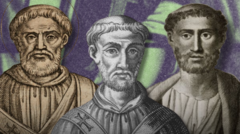North Africa, now predominantly Muslim, was historically a vital heartland of Christianity, producing influential Catholic popes whose legacies still resonate in the Church today. Spanning regions that include modern-day Tunisia, northeastern Algeria, and western Libya, this area was characterized as "the Bible Belt of ancient Christianity," according to Professor Christopher Bellitto, a historian at Kean University, USA.
As Catholics in Africa eagerly await the selection of a new pope after Pope Francis, many hope for the first African pontiff in over 1,500 years. This article revisits the contributions of three notable African popes: Victor I, Miltiades, and Gelasius I, highlighting their significant roles in shaping the Church's practices, including the celebration of Easter Sunday and St. Valentine’s Day.
**Victor I (189-199 AD)**, believed to be of Berber descent, presided over a Christian community facing persecution from Roman authorities. He is recognized for standardizing Easter celebrations on Sunday, countering various regional practices, particularly from Asia Minor, which aligned Easter with Passover. To resolve this, Victor convened the first Roman Synod, compelling compliance from bishops to unify the Church's observance, effectively establishing Latin as the Church’s liturgical language over the previously-used Greek.
**Miltiades’ (311-314 AD)** tenure marked a significant shift in the Christian experience, witnessing the gradual acceptance of Christianity within the Roman Empire. While he is noted for receiving the emperor Constantine's favor—including an official residence and permission to construct the Lateran Basilica—his role was more of a beneficiary than a negotiator during this transformation.
**Gelasius I (492-496 AD)**, although not conclusively born in Africa, is recognized as an essential figure among these popes. He was the first to adopt the title "Vicar of Christ" and articulated the Doctrine of the Two Swords, which delineated the powers of Church and state, suggesting divine superiority of the Church. Notably, Gelasius I created the celebration of St. Valentine’s Day on February 14 to honor the Christian martyr, aligning with existing pagan festivals to facilitate the Church's embrace of local customs.
After Gelasius I, no African popes emerged. This absence is attributed to various factors, including the decline of Christianity in North Africa post-Roman Empire and the rise of Islam. The historical evolution of the papacy became dominated by Italian influence, leading to the current lack of popes from Africa for nearly 1,500 years. Nonetheless, with the burgeoning Catholic community in sub-Saharan Africa—approximately 281 million in 2023, constituting 20% of the global congregation—there are discussions about the possibility of an African pope emerging in the future.
Among the potential candidates to succeed Pope Francis are Fridolin Ambongo Besungu from the Democratic Republic of Congo, Ghana's Peter Kodwo Appiah Turkson, and Guinea's Robert Sarah. Experts note that while Christianity thrives in Africa, the Church's influence and resources remain primarily in the north, suggesting that a future African pope may depend on a continued strengthening of the Church's infrastructure and support within the continent.





















